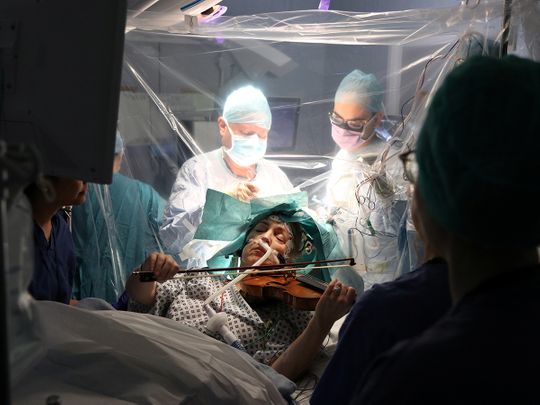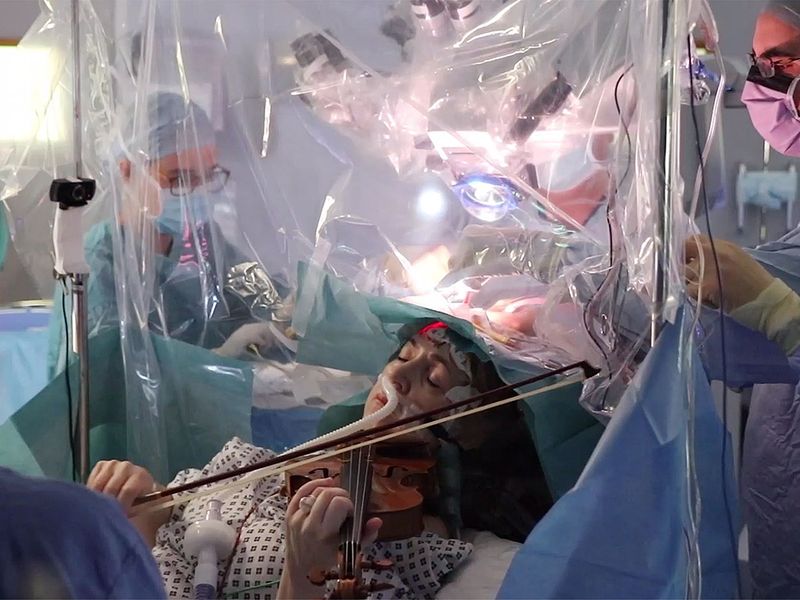
Eyes closed, Dagmar Turner ran through scales as doctors huddled behind her to peer into her open brain.
A violinist who learned of her tumor after a seizure at a symphony, Turner was anxious about losing the motor skills key to her music. The neurosurgeon knew he had to cut the bad tissue out with the utmost precision.
So he had Turner play from her London hospital bed - while staff operated.
The remarkable scene was a testament to the success of a once-contentious procedure now embraced in hospitals around the world. Surgeons working close to parts of the brain that control important functions such as speech or movement routinely keep patients awake to best determine where tumor gives way to something vital.
King's College Hospital, which treated Turner, often gives people language tests during such surgeries, said Keyoumars Ashkan, the neurosurgeon who oversaw Turner's delicate operation. But last month's procedure marked the first time he'd presided over a private serenade.
"Twenty years ago the priority would have been to preserve basic movement in a patient," Ashkan told the Sunday Times. "We wouldn't have dreamed of being able to protect the finest, most delicate, most absolute, critical executive aspect of movement needed in a violinist."
Turner learned in 2013 that she had a slow-growing tumor in her brain's right frontal lobe, according to the hospital. That meant it wasn't far from the tissue that gives her left hand such fine control over her violin's notes.
The 53-year-old turned at first to radiotherapy, the hospital said. But the tumor kept growing, and by the fall, she was told she would need surgery.
The thought of losing my ability to play was heartbreaking,
Doctors were relieved to learn Turner was right-handed, the patient recounted in an interview with ITV News. They told her that because the tumor was on the right side of her brain, it would affect movements only on her left side.
But Turner needed both hands for the violin.
"I'm like ... hang on, guys," Turner told ITV News.
The instrument was more than a hobby for the former management consultant who plays with the Isle of Wight Symphony Orchestra. It was a passion - one she had cultivated since she was 10 years old.
"The thought of losing my ability to play was heartbreaking," Turner said in a statement released by King's College Hospital.

In Ashkar, who plays piano and has a music degree, she found a neurosurgeon who understood her worries. The medical team prepared for a tricky operation, mapping parts of Turner's brain involved in her music as well as her language skills.
A spectacle
Turner went under general anesthesia while they opened her skull. But she was wide-awake for the tumor's removal, playing Gershwin, Mahler and more.
"Fantastic," one masked member of the medical teams says in footage of the surgery.
It was certainly a spectacle, but not unprecedented. In 2018, a woman played her flute in Texas while she underwent "deep brain stimulation" aimed at stopping involuntary tremors. Later that year, a jazz musician made headlines for strumming his guitar during his brain tumor removal in South Africa.
The phenomenon goes beyond brain surgery: Several years ago, the Telegraph reported how - aided by local anesthetic and hypnosis - one French woman sang her way through the removal of a throat tumor.
The seemingly bold step of keeping someone awake for brain surgery dates back decades to pioneering epilepsy treatments. Still, British neurosurgeon Henry Marsh called the technique "very controversial" in 2004, when a BBC documentary chronicled his work on a patient with a life-threatening brain tumor.
Talking with his patient mid-operation would help him remove the growth without affecting the man's speech and even his personality, he told the Guardian at the time.
"I have a fairly aggressive approach in trying to remove as much of the tumor as possible," Marsh told the news outlet. "I have to make a decision about what to recommend to patients, without having any clear body of evidence to guide me."
Now his methods are not just accepted but standard when abilities such as speech are at stake, medical professionals say. Continuous feedback from the patient - whether that means answering simple questions, raising a finger or even playing an instrument - helps doctors figure out exactly where crucial neural activity is unfolding and stop just short of it.
Turner was able to go home three days after her surgery, King's College Hospital said. She's being monitored, but she's already back to playing the violin and handling a packed schedule of TV interviews. Turner told The Washington Post on Wednesday that she was too busy to talk.
The only reported hitch from the four-hour procedure: Ashkan told British media that Turner's bow almost hit him in the head.








